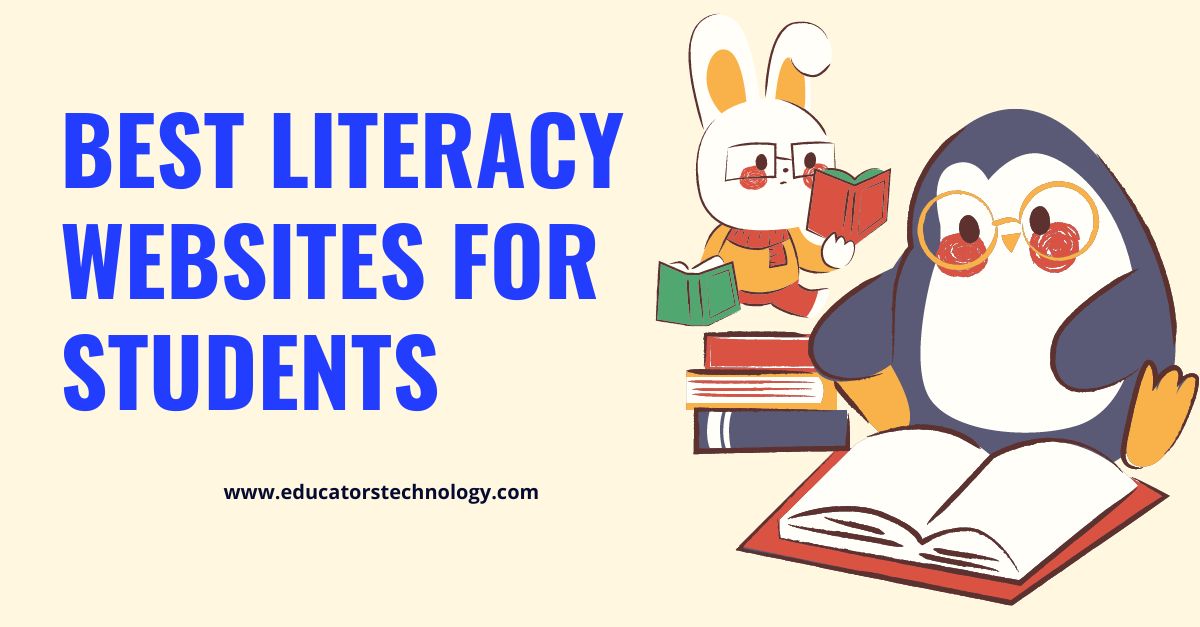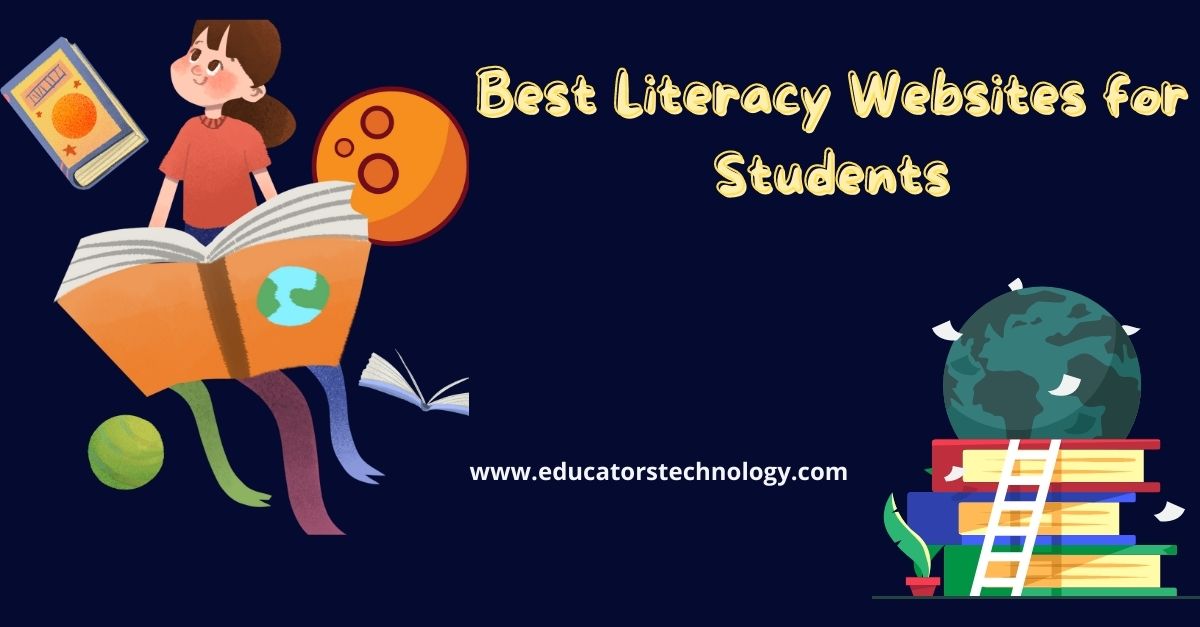Today’s post features some excellent literacy websites to help your students develop strong reading skills. These websites provide access to a treasure trove of resources, lesson plans, activities, interactive games, web tools, and several other reading materials to enhance students reading comprehension.

You will be able to find reading materials for all levels from beginner to advanced readers. I have also included a collection of digital libraries you can use with young learners to help them search for, find, and access books and digital stories designed specifically for their age.
I invite you to check them out and share with our community on social media if you have other suggestions to add to the list.
Literacy websites
Here is a list of some of our favorite literacy websites:
1- ReadWriteThink
ReadWriteThink is a platform that provides a wide variety of educational materials covering different literacy areas including reading, writing, listening and speaking.
You can use the integrated search functionality to filter resources based on criteria such as grade level, resource type, themes, learning objectives and many more.
2- Reading Rockets
Reading Rockets provides access to a wide variety of resources to help struggling readers build phonemic awareness, phonics, fluency, vocabulary, and comprehension skills.
Online courses on teaching reading, classroom strategies, in-classroom videos, parent reading tips, interviews with children’s book authors, recommended children’s books, and more.
3- Reading Bear
Reading Bear provides educational resources to help kids learn to read. These include over 50 presentations covering numerous topics including phonics principles and over 1000 vocabulary items. Here is how Reading Bear works:
‘In each presentation—playable either as a video or as an interactive slide show—we introduce one or a few related “phonics rules.” Presentations are available in seven different versions.
In the fullest version, [the tool] sounds out a word slowly and quickly, then blend it slowly, and finally (after an optional prompt) blend it quickly.
As sounds are pronounced, the corresponding letters are highlighted. Then the [tool] displays a picture illustrating the word, show a sentence (with the individual sounds again highlighted, karaoke style), and finally show a video illustrating the sentence.’
4- Reading Eggs
Reading Eggs offers self-paced and easy to follow reading games, lessons and activities .To keep students motivated, lessons includes animations, songs, fun characters, and rewards.
There are also over 3000 online books for kids each of which includes comprehension check questions. Also, Reading Eggs provides parents with access to ‘detailed progress reports as well as hundreds of full-colour downloadable activity sheets that correspond with the lessons in the program.’
5- Choosito
Choosito is a search engine that uses sophisticated algorithm to search for reading materials based on students reading levels (e.g., from early readers to advanced readers) and subject area (e.g., humanities, social studies, arts, technology, etc).
Choosito offers both a free and a premium plan. Premium subscription offers extra features such as the ability to search over 25.000 vetted videos, search teacher collections, create your own standards-aligned resources, a built-in tool to help students learn how to evaluate the quality of websites, a built-in citation tool, class analytics, student accounts and many more.
6- CommonLit
‘CommonLit delivers high-quality, free instructional materials to support literacy development for students in grades 3-12.’
7- Scholastic
Scholastic Parents provides you access to a diversified collection of reading materials to use with your students and kids. These include a Book Search tool to locate relevant reading materials, book reviews and recommendations, guides, activities, printables, Scholastic Book Club and many more.
8- Read Theory
‘Accompany your students on a journey through a vast library of reading comprehension content. ReadTheory’s adaptive approach fosters improvement by automatically meeting learners at their own, individual ability levels.
Signup takes seconds and no time is spent vetting assignments. Progress is shown on an intuitive report, replete with actionable, meaningful insights. Read Theory program is completely free.’
9- Starfall
Launched in 2002, Starfall website offers various resources to help kids and young learners develop reading and writing skills through interactive games, activities and phonics.

10- ReadWorks
ReadWorks provides a huge collection of curated nonfiction and literary articles along with reading comprehension and vocabulary lessons, formative assessments, and teacher guidance.
11- Newsela
Newsela is an educational website that offers a huge library of nonfiction texts that are aligned with states standard. These include primary sources, news articles, essays, issue overviews, foundational texts and many more. Newsela’ s reading materials are organized into five reading levels allowing students to choose the level that corresponds to their literacy skills.
Teachers are provided with tools to assess and track the progress of their students (premium feature) and to access reports on their performance.
Also, Newsela is integrated with leading educational platforms including Google Classroom, ClassLink, Nearpod, Canvas, and many more.
12- Epic
‘Epic!’s ebook library includes many of the best kids books and popular books such as Fancy Nancy, Big Nate, Warriors, Ramona, and National Geographic Kids…Epic! costs only $4.99/month with the first month FREE and supports up to 4 individual child profiles per account.’
13- StoryPlace
‘‘StoryPlace came about to provide children with the virtual experience of going to the Library and participating in the same types of activities the Library offers at its physical locations.
First launched in 2000, StoryPlace has been newly redesigned to present favorite stories and activities in a format compatible with desktop and mobile devices. The site also now includes early literacy information for parents and caregivers.’
14- Magic Blox
With a large and growing collection of eBooks for kids 1 to 13 years old, your children get to enjoy new books all the time from award winning authors and publishers from around the world.
In addition to titles you are familiar with from traditional publishers, they also have the opportunity to discover new stories from authors they’ve never heard of, or try out new languages they’ve never seen.’
Final thoughts
In wrapping up, the wealth of literacy websites we’ve delved into today are nothing short of a gold mine for educators aiming to nurture proficient readers. These platforms will help you build a rich tapestry of literacy skills, from foundational phonics to advanced comprehension.




